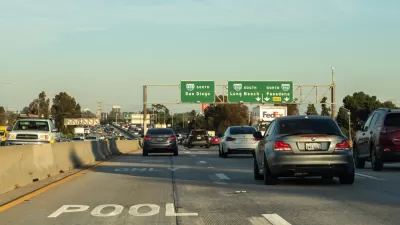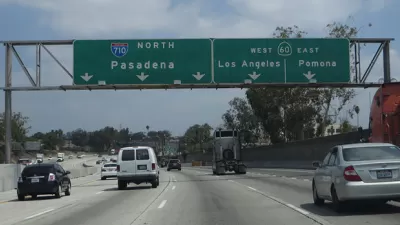After more than a decade of planning, Caltrans has officially dropped the I-710 Corridor Project, a plan to widen Interstate 710 for a long stretch of the freeway near the ports of Los Angeles and Long Beach.

The Los Angeles County Metropolitan Transportation Authority voted this week to end a $6 billion plans to expand the 710 Freeway, a key cargo corridor that connects to the ports of Los Angeles and Long Beach.
An article by Rachel Uranga details the political context for the vote, where environmental justice concerns essentially won out over concerns about traffic congestion for cargo trucks traveling to and from the ports. According to Uranga, the decision exemplifies recent momentum for alternatives to the disparate impacts of the car-centric planning status quo in the state of California. As states and regions around the nation ponder freeway expansions in low-income communities and communities of color, here is at least one example of different direction for transportation planning.
“It’s monumental that one of the biggest urban areas of the country is really thinking twice, before prioritizing goods movements over health,” says Laura Cortez, an organizer and co-executive director of the East Yard Communities for Environmental Justice, in the article.
Interstate 710 has been a hotbed of political controversy for decades. A controversial plan to extend the freeway beyond its northern terminus in Alhambra, just east of Downtown Los Angeles finally died in 2017. The final version of that plan would have spent $5.4 billion to tunnel under South Pasadena, though that plan came as a last unlikely gasp after a groundswell of freeway opposition prevented the freeway from being built through South Pasadena.
The draft Environmental Impact Report for the I-710 Corridor Project, however, released by Caltrans in August 2012, proposed widening the 710 between Ocean Boulevard and State Route 60—south of the freeway’s northern terminus—to ten lanes. Staff at the Los Angeles County Metropolitan Transportation Authority (Metro) released a report supporting the project in 2018, inspiring a scathing editorial from the Los Angeles Times. Eventually, Metro rescinded its support for the project.
According to Uranga, social and environmental justice concerns were too hard to ignore for the I-710 corridor project. “Black and Latino residents make up an estimated 83% of the 1.2 million people who live along the 710 corridor. They endure some of the worst air quality in the country. The area accounts for about 20% of all particulate emissions in Southern California, according to Metro,” writes Uranga.
FULL STORY: 710 Freeway expansion dropped after decades of planning, marking a milestone for L.A.

Planetizen Federal Action Tracker
A weekly monitor of how Trump’s orders and actions are impacting planners and planning in America.

Congressman Proposes Bill to Rename DC Metro “Trump Train”
The Make Autorail Great Again Act would withhold federal funding to the system until the Washington Metropolitan Area Transit Authority (WMATA), rebrands as the Washington Metropolitan Authority for Greater Access (WMAGA).

The Simple Legislative Tool Transforming Vacant Downtowns
In California, Michigan and Georgia, an easy win is bringing dollars — and delight — back to city centers.

The States Losing Rural Delivery Rooms at an Alarming Pace
In some states, as few as 9% of rural hospitals still deliver babies. As a result, rising pre-term births, no adequate pre-term care and "harrowing" close calls are a growing reality.

The Small South Asian Republic Going all in on EVs
Thanks to one simple policy change less than five years ago, 65% of new cars in this Himalayan country are now electric.

DC Backpedals on Bike Lane Protection, Swaps Barriers for Paint
Citing aesthetic concerns, the city is removing the concrete barriers and flexposts that once separated Arizona Avenue cyclists from motor vehicles.
Urban Design for Planners 1: Software Tools
This six-course series explores essential urban design concepts using open source software and equips planners with the tools they need to participate fully in the urban design process.
Planning for Universal Design
Learn the tools for implementing Universal Design in planning regulations.
Smith Gee Studio
City of Charlotte
City of Camden Redevelopment Agency
City of Astoria
Transportation Research & Education Center (TREC) at Portland State University
US High Speed Rail Association
City of Camden Redevelopment Agency
Municipality of Princeton (NJ)



























